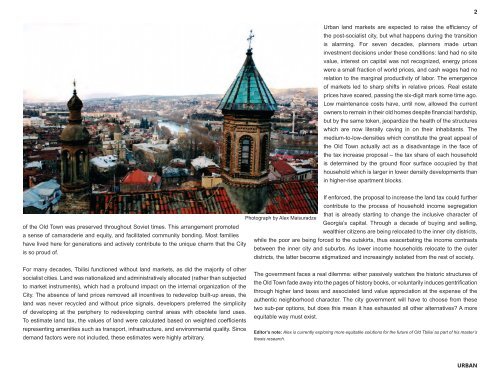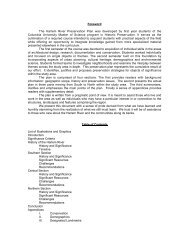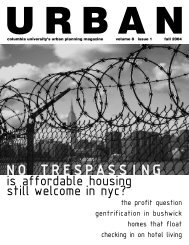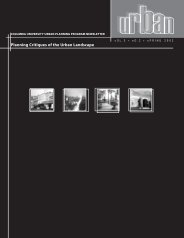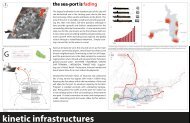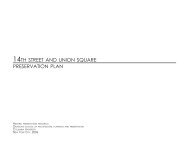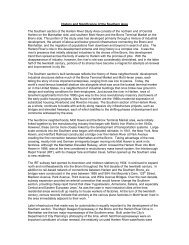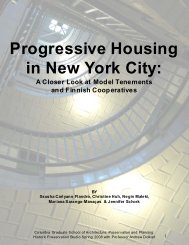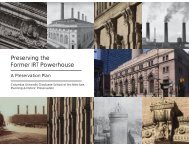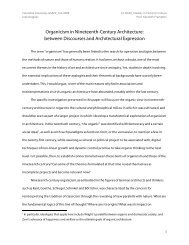The Art of Planning - Columbia University Graduate School of ...
The Art of Planning - Columbia University Graduate School of ...
The Art of Planning - Columbia University Graduate School of ...
You also want an ePaper? Increase the reach of your titles
YUMPU automatically turns print PDFs into web optimized ePapers that Google loves.
2<br />
Urban land markets are expected to raise the efficiency <strong>of</strong><br />
the post-socialist city, but what happens during the transition<br />
is alarming. For seven decades, planners made urban<br />
investment decisions under these conditions: land had no site<br />
value, interest on capital was not recognized, energy prices<br />
were a small fraction <strong>of</strong> world prices, and cash wages had no<br />
relation to the marginal productivity <strong>of</strong> labor. <strong>The</strong> emergence<br />
<strong>of</strong> markets led to sharp shifts in relative prices. Real estate<br />
prices have soared, passing the six-digit mark some time ago.<br />
Low maintenance costs have, until now, allowed the current<br />
owners to remain in their old homes despite financial hardship,<br />
but by the same token, jeopardize the health <strong>of</strong> the structures<br />
which are now literally caving in on their inhabitants. <strong>The</strong><br />
medium-to-low-densities which constitute the great appeal <strong>of</strong><br />
the Old Town actually act as a disadvantage in the face <strong>of</strong><br />
the tax increase proposal – the tax share <strong>of</strong> each household<br />
is determined by the ground floor surface occupied by that<br />
household which is larger in lower density developments than<br />
in higher-rise apartment blocks.<br />
<strong>of</strong> the Old Town was preserved throughout Soviet times. This arrangement promoted<br />
a sense <strong>of</strong> camaraderie and equity, and facilitated community bonding. Most families<br />
have lived here for generations and actively contribute to the unique charm that the City<br />
is so proud <strong>of</strong>.<br />
Photograph by Alex Maisuradze<br />
If enforced, the proposal to increase the land tax could further<br />
contribute to the process <strong>of</strong> household income segregation<br />
that is already starting to change the inclusive character <strong>of</strong><br />
Georgia’s capital. Through a decade <strong>of</strong> buying and selling,<br />
wealthier citizens are being relocated to the inner city districts,<br />
while the poor are being forced to the outskirts, thus exacerbating the income contrasts<br />
between the inner city and suburbs. As lower income households relocate to the outer<br />
districts, the latter become stigmatized and increasingly isolated from the rest <strong>of</strong> society.<br />
For many decades, Tbilisi functioned without land markets, as did the majority <strong>of</strong> other<br />
socialist cities. Land was nationalized and administratively allocated (rather than subjected<br />
to market instruments), which had a pr<strong>of</strong>ound impact on the internal organization <strong>of</strong> the<br />
City. <strong>The</strong> absence <strong>of</strong> land prices removed all incentives to redevelop built-up areas, the<br />
land was never recycled and without price signals, developers preferred the simplicity<br />
<strong>of</strong> developing at the periphery to redeveloping central areas with obsolete land uses.<br />
To estimate land tax, the values <strong>of</strong> land were calculated based on weighted coefficients<br />
representing amenities such as transport, infrastructure, and environmental quality. Since<br />
demand factors were not included, these estimates were highly arbitrary.<br />
<strong>The</strong> government faces a real dilemma: either passively watches the historic structures <strong>of</strong><br />
the Old Town fade away into the pages <strong>of</strong> history books, or voluntarily induces gentrification<br />
through higher land taxes and associated land value appreciation at the expense <strong>of</strong> the<br />
authentic neighborhood character. <strong>The</strong> city government will have to choose from these<br />
two sub-par options, but does this mean it has exhausted all other alternatives? A more<br />
equitable way must exist.<br />
Editor’s note: Alex is currently exploring more equitable solutions for the future <strong>of</strong> Old Tbilisi as part <strong>of</strong> his master’s<br />
thesis research.<br />
URBAN


